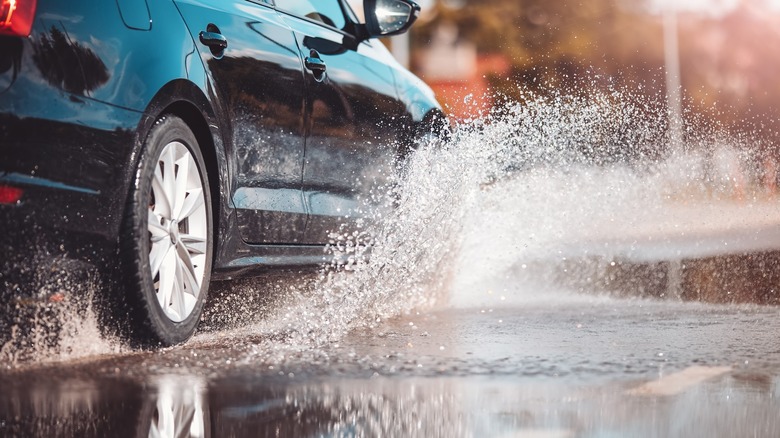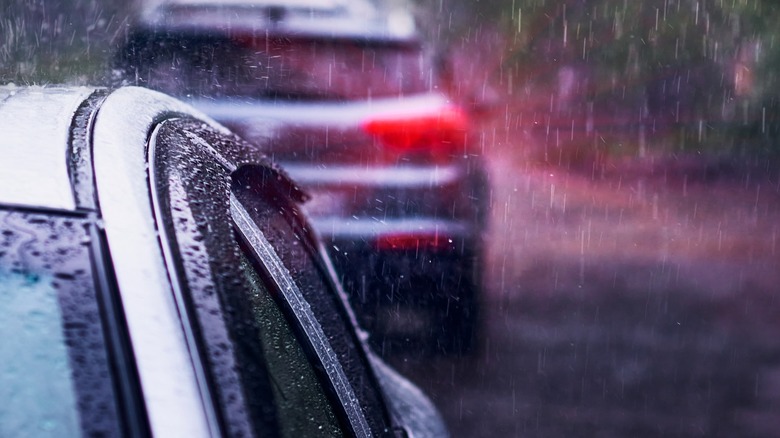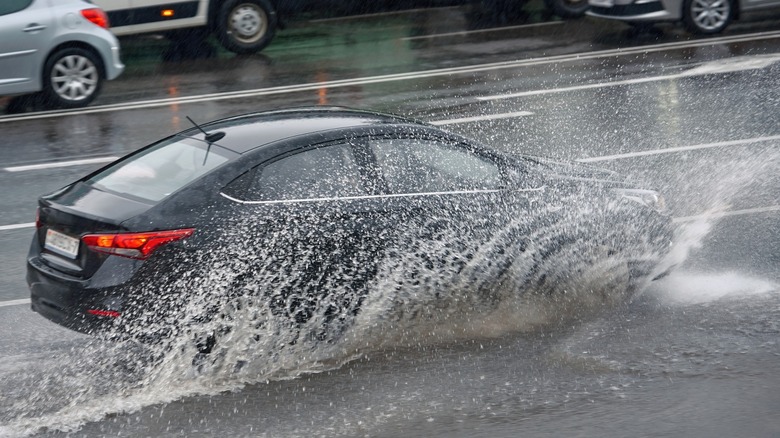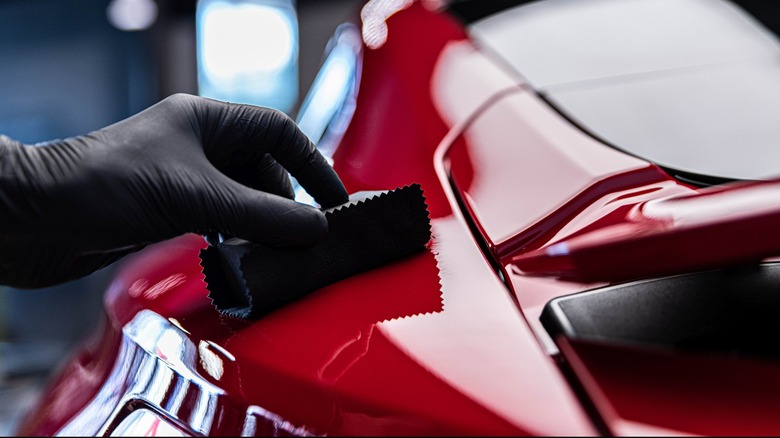Why Car Experts Say You Should Wash Your Car After Bad Weather
There are few things less appealing than a car that's covered in rain spots, pollen, and all manner of gunk after a bad storm. The dusty film left over from the rain takes away from the sheen of your car's paint job, making it difficult to appreciate its beauty. All of that is more than just a visual distresser, though. If left untouched, the remnants of a rainy day can actually be problematic for the longevity of your car's paint job.
Whether it's build-up from heavy rain or the unavoidable byproduct of a salted road in the winter, your car is being covered in more than dirt. Rainwater isn't clean, no matter how you spin it. We won't get into whether it's safe to drink, but we can confirm that it's ultimately not great for your vehicle.
All the different chemicals and pollutants that find their way into our rainwater can be like acid to your car's paint. Even winter weather can be detrimental to your car, as salt used for melting ice can cause rust to the untreated undercarriage.
Ultimately, it's important to keep your car clean after a storm to prevent damage to both the paint job and the body.
When to wash your car after a storm
According to Progressive Insurance and a CBS News report that called upon experts to discuss the effects winter weather can have on your vehicle, it's important to wash your car as soon as possible after a rainy day or time spent on a salted road. In the CBS report, Tyler Schaede of Christian Brothers Automotive in Dallas, TX, notes that the brine content of the road salt is what causes damage to the car's paint job and metal framework.
While a Jalopnik piece focuses primarily on winter weather conditions, the reasoning is the same for any car in a rainy or humid environment. Rust is a common problem among vehicles in cold and wet environments, and it can very easily spread when a car isn't properly cared for and cleaned after poor weather conditions.
Though the main reason for cleaning your car after a storm may be cosmetic, there's another potential cause for concern. When it snows, the wheel well can become packed with snow and the dirt and salt it collects throughout the season. All of this buildup can impact how a car performs. It may become difficult to maneuver or brake safely.
A rainy day won't clean your car
Even during the winter, when snow and salt may be your biggest enemies, it's important to remember that rain isn't your friend. When experts say you should get your car cleaned after every rain, that's a year-round bit of advice.
Other experts further support the idea that rain isn't a suitable replacement for a thorough cleaning. Not only does rain not have enough pressure to effectively remove the layers of dirt and film that can damage your paint job, but it will also make your car dirtier.
Don't forget, the rain is dirty. While it may remove some of the gunk left by salt or the leafy remnants of a windy storm, it's still going to leave rain spots and its own layer of pollutants and dirt. If you rely on the rain to clean your car, you could risk sun damage.
As Progressive explains, the sun can react to "foreign substances" or "acidic compounds," resulting in damage to the paint and frame. Some of these substances and compounds can be carried by rain or wind during a storm.
How to wash off the excess left by rain
Knowing why and when to wash your car after a storm is only half the battle. You also should know the most effective ways of removing dirt, dust, and pollutants carried by the storm. To get the job done at home, use buckets, a water hose, a car cleaner, a sponge, and a brush. If you're worried about ruining your lawn, use a biodegradable soap.
While you can use a car wash, it's actually better that you wash your car by hand. Auto detailers caution that some car washes use recycled water full of dirt and pollutants or aggressive cleaners that can strip away wax or sealants.
Regardless of how you're cleaning your car, there's a rule of thumb to consider: using only water isn't enough. You need that soapy component that breaks down dirt and grime and removes the paint-harming substances left on your car after a storm.
How to prevent buildup in the future
If you don't want to go through the hassle of worrying about your car after a rain, you do have some options. Of course, the best option is to keep your car indoors during a stormy season. While it may not be possible to keep your car indoors at all times, even a cover can help keep the surface dry if you're not planning to drive for a prolonged period.
To be proactive, you can wax your car. With a protective coat of rain-resistant wax, water should bead up on your car and eventually roll off. It won't dry and leave behind a damaging residue. A wax coating isn't permanent, though. You will need to reapply the coating at least twice a year, though that will vary depending on your climate.
Unfortunately, even waxing your car isn't foolproof. As previously mentioned, the undercarriage will remain untreated and unprotected. So, you'll need to keep an eye on any buildup during the winter and remove it by hand as soon as possible.




